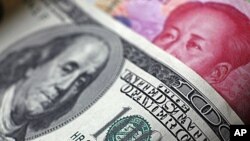A renewed dispute is looming between Beijing and Washington about the competitive advantages in global trade that China enjoys thanks to its government’s rigid control and valuation of its currency, the yuan, also known as the Renminbi [RMB].
In Washington, the U.S. Senate is threatening to legislate trade sanctions against China because of the issue.
By fixing its exchange rate for the yuan below the market value, Beijing keeps its exports cheaper for foreign consumers, providing Chinese manufacturers with a considerable competitive advantage in global trade.
The Economic Policy Institute in the United States reported last week that, since 2001, China’s use of exchange rate controls has contributed to the loss of nearly 3 million American jobs.
Sense of entitlement
Arthur Kroeber is managing director of GK Dragonomics. He argues that China sees its undervalued currency and trade surplus as a right - and a key part of its national economic development.
“There is no other demonstrated way to become a rich and powerful country other than, at your early stage, to promote exports. One of the tools to promote exports is to run an undervalued exchange rate," said Kroeber. "The Chinese take the view that, ‘Everyone else who has gotten rich has used the same technique… we want to get rich; we have the same rights as everyone else.'”
Because Beijing’s economy depends heavily on exports, Janet de Silva, the dean of the Ivey Business School in Hong Kong, said it is difficult to predict how Beijing might liberalize currency.
“If China were to move to full convertibility, the RMB would appreciate greatly, perhaps as much as 20 percent against the U.S. dollar, making Chinese exports less viable,” said de Silva.
To level the playing field between U.S. and Chinese manufacturers, U.S. Senate Majority Leader Harry Reid said this week that work will soon begin on a bipartisan bill that would make it easier for China to be labeled a currency manipulator and for trade sanctions to be imposed on Chinese goods.
Pros, cons of trade sanctions
Although many U.S. business groups oppose such legislation for fear of sparking a full-blown trade war with China, Diana Choyleva, of Lombard Street Research, understands the rationale for the bill.
“Unfortunately, in the short-term, the U.S. faces a sharp downturn. So, in an election year... protectionist voices are on the rise again. You can imagine; the easiest entity to blame would be the foreigner. And, in this case the U.S. would be right,” said Choyleva.
China disagrees that its exchange rate is contributing to American economic woes.
During the recent International Monetary Fund and World Bank meetings, Chinese officials have been keen to point out that the yuan has in fact been gradually appreciating for some time, and this week reached its highest rate since 2005.
In Beijing, foreign ministry spokesman Hong Lei rejected that the exchange rate was affecting the trade balance between China and the United States. He said China hopes the United States will refrain from politicizing the exchange rate and trade issues.
China's aversion to liberalized yuan
Chinese officials have been reluctant to liberalize the yuan because it likely would reduce the competitiveness of Chinese exports and fuel job losses, which could lead to social unrest.
But keeping the yuan under tight government control also carries costs. It means China’s currency is not internationally traded, so many global businesses continue to price goods and contracts in dollars.
Analyst Kroeber said Chinese concerns about the stability of the dollar are becoming a catalyst for Beijing to try to internationalize the use of the yuan.
He said that the goal of the Chinese leadership, 10 or 20 years from now, is to create an internationally accessible bond market large enough to make the Chinese yuan a reserve currency like the dollar.
“What they’ve been trying to do is increase the use of renminbi for settling and invoicing trade. If you have concerns about the currency in which your trade is denominated, traditionally U.S. dollars, using your own currency is a good solution to that,” said Kroeber.
Strategic use of 'dim sum' bonds
China still restricts foreign investors from broad participation in its economy, but is using Hong Kong as a gateway for investment through programs such as “dim sum” bonds. These are yuan-denominated debts sold in Hong Kong since 2009 and named after a tasty appetizer much loved in China.
Dim sum bonds are attractive to global brands, such as Tesco and BP, as well as Chinese companies interested in raising and investing money through bonds that have lower repayment rates than those denominated in U.S. currency.
Professor de Silva said foreign and domestic investors in the debt tolerate yields as low as 1.7 percent in the belief they will make more gains as the yuan continues to appreciate.
“If we look over the past year, RMB appreciation to the U.S. dollar is around six percent. And, the forecast over the next five years is about four percent per year. So if you take the 1.7 percent yield, plus that four percent yield, it starts to look quite attractive,” said de Silva.
Although investors may be banking that the yuan will rise in value, there are still serious doubts about whether a truly liberalized yuan will become a reality anytime soon. As the yuan develops into a more globalized and mature medium of exchange and store of value, Chinese leaders indicate that currency policy will continue on their terms, and not those of China’s trading partners.
China Pushes for Currency Internationalization




